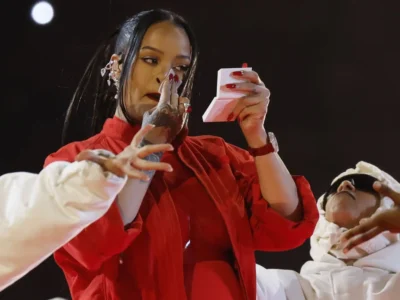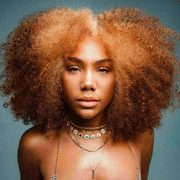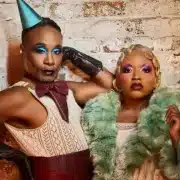Beyonce has such an enigmatic personality that you think you’re trying to figure her out, but you get lost again. From her 2003 break-out movie Fighting Temptations where she played the church girl gone bad role, to being the lead singer of the former R&B trio, Destiny’s Child, getting married to high-profile rapper Jay-Z, and playing the ultimate supportive wife character to delivering soulful tracks like I Was Here, showing up as a bad b*tch in songs like Partition and Formation and lending her voice for black people in the Disney film Lion King alongside her new movie, Black is King.
Over the years we’ve seen so many personalities of the pop star. However, one thing remains constant. Beyonce is always going to act as an inspiration to black women and women at large, urging them to feel confident in themselves, own their skin colour, and float in their colossal beauty and powers. One of the things she portrays in her new album, Renaissance.
There’s a way Bey adopts current happenings and portrays them in a light that makes you see them better. Recall, 2019’s live album and concert movie, Homecoming which documented her Beychella festival set in which she indelibly framed her entire discography within the larger history of contemporary Black American performance ensuring that black art receives the credit its due.
Again, during the pandemic, a time when people were put on lockdown in their homes, clubs were closed, and religious houses were shut, Beyonce picked up pen and paper to cook up something new so people could listen to her music and remember this unforgettable era. The album would grow to become Renaissance: the birth of something new; a new era.
Renaissance is a feat of imagination, daydreaming about partying in the pandemic, capturing the feeling of thinking about all the places you wish you could have gone when you were just stuck at home. According to Beyonce, “it’s a safe place for you to scream, release and feel freedom.” Well, ‘scream’ it did as most of the songs take up very hyped tones, no ballads or heartbreak songs just pure energy, and bad girl b*tch kind of vibes.
View this post on Instagram
The pursuit of Black heritage is central to the record, as she draws on house music and particularly New Orleans bounce to join the latest wave of Black stars reclaiming gentrified genres that they were once pushed out of. Samples and collaborators on Renaissance include influential Black figures like Barbara Ann Teer, founder of Harlem’s National Black Theatre, as well as rapper Big Freedia and producer Honey Dijon.
As usual, just like other Bey songs, the transitions are on point and sometimes you don’t know when it’s moved to the next song. The songs are also layered and varied with references from different places. She starts up with a gradual build-up in I’m That Girl that sees her transform into sensual teases and the fast beats and then back and forth. The song makes you feel like you’re on some kind of hypnotic drugs as she sings about being ‘that girl’.
The second track takes up a vibey tone typical of the entire album priding herself in confidence with lyrics like: “Comfortable in my skin, cozy with who I am, I love myself, goddamn, cozy, cozy.” While the song seems like a self-love song, the part where she says “might suggest you don’t fuck with my sis” feels like she’s also addressing the rumours of the elevator fight between her sister Solange and husband, Jay Z.
“Church Girl” exemplifies Renaissance’s resourceful slipperiness, sampling the 1981 Clark Sisters’ gospel track, Center Thy Will. Beyoncé fills the sample out with rapturous harmonies but suddenly, it begins to sound like a twerk song filled with trap drums. Drawing your ears closer to the lyrics, however, it seems like that’s the essence of the song. To exemplify church girls who still like to party and break free. It kind of feels like the inspiration for this song is from the Fighting Temptations movie where she played the church girl gone bad role.
Songs like Pure/Honey and Alien Star make the album feel like a guided tour of black dance history. It takes you back to juxtaposing productions of 80’s radio pops, the brash beats, and braggadocious commendation where people just wanted to go to clubs in their Afros and boot cuts and enjoy themselves. A more uncomplicated and relaxing era.
Still her first U.S top 10 single in six years, the lead single, Break My Soul was a boisterous and euphoric slice of 90s diva house, albeit not exactly groundbreaking. We all know Beyonce could rap but Thique reminds us of how good and versatile she is with bars and melodious sensual miming.
Plastic Off The Soda offers up groovy R&B sound that allows Beyoncé to show off her powerful chops as she riffs and runs all over the punchy jazz band accompanying her hushed tone, “I think you’re so cool, even though I’m cooler than you,” she winks. Beyonce also pays homage to industry trailblazers with Grace Jones making an appearance on the bounce inspired ‘Move’ and Donna Summer’s classic I Feel Love sampled on ‘Summer Renaissance.’
Due to the increasingly politicized nature of Beyonce’s work over the last decade on projects like Lemonade that focused on the historical impact of slavery on black love, one would have thought Renaissance would continue in this trend especially seeing the term ‘Renaissance’ which is associated with a lot of political history. However, Beyonce was able to create a feel-good dance album full of samples that pay homage to the past and still touch on black heritage. The album also shows us that with Queen Bey, you never know what to expect.
View this post on Instagram
















